Mehr als 15 Jahre Radio Corax – CAPTCHA Radio Show #20
Dieses Jahr wurde in Halle an der Saale ein weiterer Geburtstag des Freien Radio in Sachsen-Anhalt begangen: 15 Jahre seit lizenziertem Sendestart im Juli des Jahr 2000. Die #20. CAPTCHA-Radiosendung zum Jubiläum macht sowohl den Weg (mit der Zielstellung Audio-Material zu den Ereignissen am 11. September 2001 in New York City zu finden) in die sogenannte Archive der selbst verwalteten Radiostation, als auch das dort befindliche Audiomaterial hörbar.
Ein Schwerpunkt der Sendung liegt auf für diese Sendung digitalisiertem Material, welches sich auf VHS-, MC- und DAT-Kassetten befand und noch teilweise aus der Zeit vor dem offiziellem Sendestart stammt, einiges sogar aus dem Jahr 1994.
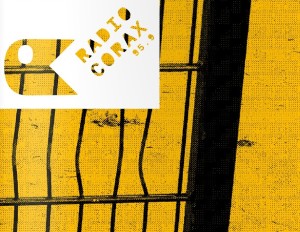
1998 sendete Radio Corax ein 48stündiges Aktionsradio anlässlich des Paulusfest in der Stadt – einiges damals entstandenes Material bzw. Radiomitschnitte (teilweise minderer Qualität) werden der in der Sendung wieder akustisch-lebendig. Die ausgewählten Beiträge aus den frühen Jahren von Radio Corax zeigen jedoch nur exemplarisch sowohl den verschiedenen Umgang mit Inhalten als auch die Form der Präsentation – der Großteil an gesendeten Radiostunden findet sich heute nicht mehr in den Räumlichkeiten und versendte sich mit den UKW-Wellen für immer.
In der Sendung sind immer wieder Statements von Ralf Wendt zu hören, der Gründungsmitglied des Vereins und heute unter anderem als Programm-Koordinator und Radiotrainer für Radio Corax aktiv ist.
Zu hören ist auch eine Collage, welche in unmittelbarer Reaktion auf die Flugzeugentführungen und Attentate 2001 auf das World-Trade-Center entstand. Wie auch eine Sendung, welche unter dem Titel “Hühnermanhatten” als schräges-durchorganisiertes-improvisiertes Morgenmagazin zu finden war.
All the music played on the show can be found at freemusicarchive.org and is published under Creative Commons license (September 2015).
download
In the summer of 2014 we recorded a series of interviews with residents of Coolock, Santry, Raheny, Artane, Donnycarney, Sutton and more. They share with us their stories, memories and experiences of living in these areas and reflect on how they have changed over the years. “Living Archives” is being launched as part of Near FMs 20th birthday celebrations and will be broadcast as part of the festivities.
Programme 1: Jack Byrne
Area: Coolock

Jack speaks about moving to Coolock in the 1960s, watching the area transform with the development of the factories (Cadburys, Tayto) as well as the arrival of the Northside Shopping Centre. He also speaks of his own involvement in setting up the Coolock/Artane credit Union, NearFM and others in the area.
download
Programme 2: Connie O’Reilly
Area: Santry
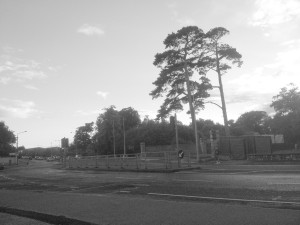
The change from having cattle in her garden to housing being built. Living beside the airport. What they did for entertainment at the time. transport links to the city centre. She speaks of her time as part of the residents committee and also of the arrival of DCU to the area.
download
Programme 3: Vincent Flood
Area: Donnycarney/City Centre
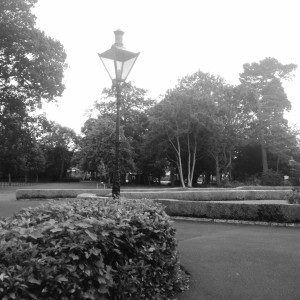
Vincent reads a short story from his autobiographical book “The Ambidextrous hound”. This particular story focuses on his family life after his fathers return to the family home at the end of World War two.
download
Programme 4: Declan Cahill
Area: Coolock/Artane/Glasnevin/Drumcondra

Declan discusses what Dublin was like when he first moved here from Cork. He tells us of his memories of the Dublin Monaghan bombings in 1974. He talks about his home in Coolock and the quailty of house building at the time.
download
Programme 5: Janet Flynn
Area: Marino
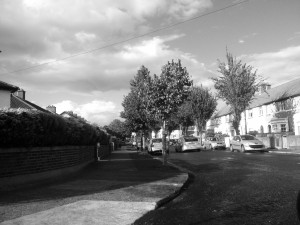
Janet moved to Marino in 1957. She maps out the various local shops for us at the time and describes what it was like to live in the area during the 1950s. She tells us about the family life at that time and what they did for entertainment.
download
Programme 6: John Haughton
Area: Bayside, Sutton
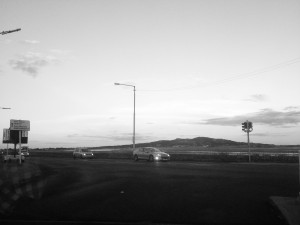
John moved to Bayside in the late 1960s and tells us about the sense of community spirit that existed in the area at the time. The transport links were one of the factors that brought them to Bayside as well as his love of the sea which is located nearby. He also tells about his love for Howth and it’s natural beauty.
download
Programme 7: Hilda Beare
Area: Raheny
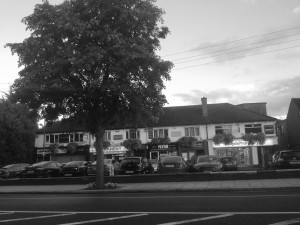
Hilda moved to Raheny in the 1950s. She tells us in great detail what the village was like at that time and how it has changed over the years. We hear stories of raising her children and she maps out how Raheny has developed over her time there.
download
Programme 8: Geraldine Murphy
Area: Raheny, Clontarf, Whitehall

Geraldine tells us about her childhood growing up near St.Annes park in Raheny. She tells us about the park and regales us with anecdotes about what they did in the area for fun when she was growing up. She also shares with us her mothers experiences of growing up in Whitehall having moved from the city centre in the 1930s.
download
A live radio show with participants of the CAPTCHA conference with various topics like an automatic archiving system from A Coruna, a visualisation tool developed within the CAPTCHA project, meta data, archiving offline and audio archives from artists point of view.
Während der Konferenz zum Projekt CAPTCHA gab es auf Radio Corax eine Radiosendung zum Thema und über die Konferenz zu hören. Diesmal:
Johannes Wilms (Mitglied bootlab.org und Mitinitiator von u.a. juniradio, radioriff auf reisen, mikro.fm und colaboradio) zu Gast, der mit grundlegenden Fragen zum Thema Archivierung und Archiv konfrontiert wird. (de)
Im Gespräch mit CUAC-FM-Aktivisten über die Verwendung von Software und deren derzeitige Archivierungsmethode. (en)
Gespräch mit Ingo Leindecker about the new visualisation-tool. (de/en)
Zu Gast Caroline Mitchell und Jacob Kreutzfeld über die Bedeutung von Community-Radioprogrammen wie FEM-FM, Community-Archiven, die Herkunft von Meta-Daten und vieles mehr. (en)
Radio Student goes Radio Corax – Live-Show by Marko Doles and Andraz Magajna from Slovenia. (de/en)
Interview mit Lale Rodgarkia-Dara und Karl Schönswetter über die anstehende Performance, die Bedeutung von Archiven und unseren Umgang damit in der heutigen Zeit von Big-Data. (en)
All the music played on the show can be found at freemusicarchive.org and is published under Creative Commons license (june 2015).
download
5:25 Eindrücke von Kongressbeginn – Gespräch mit Gregor
11:37 zu Gast: Johannes Wilms – Gespräch über Konferenz, Text “Rescue, replay, reproduce”, Datenbank-Programm Open-Meta-Archive (OMA) + OPA;
15:12 @ Johannes Wilms: Was ist das Spannende an Archiven?
21:10 @ Johannes Wilms: Radio als immaterielles Medium?
23:55 @ Johannes Wilms: Radio nicht für VHS-Kassetten produziert, oder?
25:20 @ Johannes Wilms: Aufnahmen/Speicherung bedeutender als Ausstrahlung?
30:18 @ Johannes Wilms: Speichern als Einflussfaktor während des Produktionsprozess?
31:37 @ Johannes Wilms: Hörgewohnheiten beeinflussen Archvierungsmethoden?
32:11 Music: Torley – Just we like it (cc-Lizenz)
34:19 Radio Tilos/Budapest zum Media-Act (2013)
37:20 Johannes Wilms über die Situation in Ungarn, Bela Bartok, Kudaj
40:57 Automatisiertes Archiv bei Tilos Radios in Ungarn
43:18 Frage nach Verantwortlichkeit von Freie-Radio und Community-Media-Archiven
44:44 Johannes Wilms über Radio Student
46:52 Lublijana als kultureller Ort
48:10 über calcMS zur Programmsteuerung und -archivierung bei Colaboradio
50:45 Music: Emorej – Rain come down (cc-Lizenz)
56:30 Guests from CUAC-FM
1:03:21 Music: Neo diao – In game (cc-Lizenz)
1:06:49 CBA – Gespräch mit Ingo Leindecker about the new visualize-tool (dt/engl)
1:19:04 Music: Nokom Elektro – Dub fiction (cc-Lizenz)
1:24:23 Conversation with Caroline Mitchell and Jacob Kreutzfeld
1:25:25 @ Caroline Mitchell: Does Fem-FM changed the consciousness about the importance of feminist topics in media?
1:31:00 Caroline Mitchell: More than one feminist archive – lets link and connect
1:33:00 Historical speaches are preserved with aim – what about unrecorded and unheard female voices?
1:34:07 @ Caroline Mitchell: Is it hard to find archived material from or about groups which are ignored by mediamaker?
1:35:35 Jacob Kreutzfeld: Experiences with Danish Archive and gender issue
1:37:03 @ Jacob Kreutzfeld: No topic – no archiving?
1:37:37 Fan-Archives and Pirate-Radio-Archives
1:38:49 Caroline Mitchell: Radio-Gay-Programme in Sunderland
1:40:11 @ Jacob Kreutzfeld: LARM-project is also about gay-programmes oder Pirate-Stations?
1:41:25 @ Jacob Kreutzfeld: Where are Meta-Data you use from?
1:43:40 @ Jacob Kreutzfeld: This is a primary national project?
1:44:50 The phrase community and what are community-medias?
1:47:45 Thanks for coming along!
1:48:22 Radio Student goes Radio Corax – from Lublijana to Halle
2:25:36 Interview with Lale Rodgarkia-Dara and Karl Schönswetter
2:47:00 Music: Revolution Void – Implanted Information
A live radio show with participants of the CAPTCHA conference with various topics like a feminist action radio, an oral history project in Dublin, archiving methods in the local free radio Hamburg and more.
In dieser Live-Sendung zur Konferenz des Projektes CAPTCHA liegt ein Schwerpunkte auf dem Archiv von FEM-FM, einem feministischen Aktionsradio in UK welches in der Sendung vorgestellt wird.
Daneben gab es Besuch von NearMedia aus Dublin, welche ein aktuelles lokales oral-history-Projekt vorstellten. Neben den Besonderheiten der “Erinnerung von unten” berichteten sie auch über ihre derzeitgen Pläne zum Thema Archivierung (en).
Die Frage nach einem/einigen historischen Moment/en des Projektes CAPTCHA im Jahr 2013 an Beteiligte zu Beginn des Jahres 2014 wurde sehr unterschiedlich beantwortet. (en)
Dagmar Brunow (Universität Växjö, Sweden; FSK – Hamburg) berichtet im Gespräch über die Archivierungspraxis beim Freien Radio in Hamburg, über Schwierigkeiten, Unmöglichkeiten und Wünsche der zukünftigen Gestaltung praktikabler Methoden. (de).
Ein Fund aus dem Archiv bei Radio Corax aus dem Jahr 1994 macht die Bedeutung eines nichtkommerziellen lokalen und zugangsoffenem Archiv deutlich.
download
All the music played on the show can be found at freemusicarchive.org and is published under Creative Commons license (june 2015).
2:38 Music: Revolution Void – The turtle speaks
9:36 Übersicht über Konferenz und Veranstaltungen
17:30 Music: Torley – Vampires
21:10 About the History of FEM-FM
53:30 Music: Avni – Vocalize
59:15 Guests from NearMedia/Dublin; Topics: Oral history in Southside and archiving at NearMedia
1:27:07 Music: Emorej – Elvis Fan
1:38:50 Looking-Back: Audio-Recording/beginn 2014: Historical moment @Virag
1:43:00 Historical moment @Franz
1:45:43 Historical moment @Helen
1:50:03 Music: Nokom Electro – V-Lan
1:53:07 Gast: Dagmar Brunow
2:09:15 Music: Ejouhaki – Nostalgia
2:16:52 Gast: Dagmar Brunow
2:33:00 Music
2:40:04 Radio-Corax-Archiv 1994 – Demonstration in Halle gegen Kürzungen an der Universität
2:49:06 Music: Roy – Clubbing with Roy
A live radio show one day before the conference in Halle with Gregor Kliem, Franziska Stübgen and Helen Hahmann.
In dieser Livesendung anlässlich der CAPTCHA-Konferenz kommen einige der an dem Archivprojekt Beteiligte zusammen um zu reflektieren, zu diskutieren und über ihre Aufgaben während der anstehenden Tagen zu berichten.
Mit dabei: Gregor Kliem, Franziska Stübgen, Helen Hahmann
Zu hören sind Eindrücke von einem Besuch bei Radio Tilos in Budapest, Aufnahmen einer Zugfahrt und historische Aufnahmen aus dem Archiv von Radio Corax (von Magnetbandkassette) von Mitte der 90er Jahre mit Kritik an der Medienlandschaft.
download
All the music played on the show can be found at freemusicarchive.org and is published under Creative Commons license (June 2015).
The CAPTCHA close-up conference took place in the framework of the European collaborative project CAPTCHA Creative Approaches to Living Cultural Archives on 5-6 June 2015 in Halle, Germany with over 50 participants.
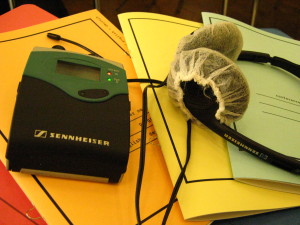
How will we remember the history and the sound of today’s community radios in the future, and what in particular will we remember about them? How are free radio stations recording and documenting their programmes?
The content being created by free radio stations across Europe is often only partially or intermittently documented and archived, and only a small percentage of these broadcasts is available online as podcast.
We collected best practices of archiving methods, asked radio activists to present their online tools or other software systems which has been developed to save audio content.
Please feel free to listen and spread the audio recordings of the presentations:
Radio Archiving Practice. Remediating Sonic Memories by Dagmar Brunow, Universität Växjö, Sweden
LARM Audio Research Archive – Opening radio heritage for research use by Jacob Kreutzfeldt, University of Copenhagen
Re-sounding feminist radio: using radio archives as transnational connectors by Caroline Mitchell, University of Sunderland, UK
Bold strides or tentative steps? How community media share and archive content online by Joost van Beek & Kate Coyer, Central European University Budapest, Hungary
Radio Urban FM, Prishtina, Kosovo by Berat Gashi, Radio Urban FM, Prishtina, Kosovo
30 years rolled by: Archiving physical archives of oldest European non-commercial student radio station Radio Študent Ljubljana by Marko Doles & Andraž Magajna, MTLRŠ, Ljubljana, Slovenia
From manual analogical recording to Radioco, our Free Software automatic digital archiving of live broadcasting system at CUAC FM by Jose Maria Casanova, Fernando Souto & Isabel Lema Blanco, CUAC FM, A Coruña, Spain
Our current archiving method by Daniele Fisichella & Amy Nomvula Smith, Future Radio, Norwich, UK
Programme calendar as archive: calcms by Milan Chrobok, Pi Radio, Berlin, Germany
UVisualize! – Visualisation tool for open archives by Ingo Leindecker, Radio FRO, Linz, Austria
Archiving at Frequence Sille since 2003 by Frank Pohu and Fréquence Sillé, Sillé le Guillaume, France
Taxonomie der sonoren Ordnung an artistic performance by Lale Rodgarkia-Dara & Karl Schönswetter, Vienna, Austria
Preserving audio memories – A discussion about the prospects and demands of free radio archives a round table discussion with Ingo Leindecker from the Cultural Broadcasting Archive (Austria), Ralf Wendt from Radio CORAX (Germany), Dagmar Brunow from the Universität Växjö (Sweden), and Joost van Beek from Central European University (Hungary)
Please find some visual impressions and detailed informations on the conference on our conference website.
Throughout several months, Radio CORAX, the Free Radio in Halle, hosted personal conversations about life in the GDR, more specifically: about living conditions in different life situations and about the thoughts about what changes should be (should have been) necessary in the socio-political conditions in the GDR.
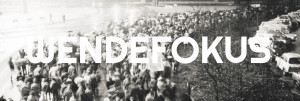
In these conversations, witnesses talk about how they perceived 1989, how they experienced the time between the fall of the wall and the “reunification”. They tell the story of citizens for whom the old laws no longer and the new ones were not yet applicable; of open spaces that got lost again; of the spirit that claimed GDR socialism was reformable; the story of the gap between individual experience and collective memory of this very period. Besides well-known personalities of today, the Radio Archive Wendefokus offers a platform for people who are heard less often but nevertheless have a lot to say about that special time. The recently published discussions are supplemented on wendefokus.de by analysis and background reports. This radioshow portraits the Wendefokus-Archive.
/”Bei Torsten Hahnel formierte sich eine stark distanzierte Haltung zum Staat, die durch das restriktive Auftreten der staatlichen Repräsentanten noch radikalisiert wurde. Götz Rubisch sendete Mitte der 70er Jahre kurzzeitig in Halle Piratenradio: Nicht ohne Konsequenzen. Alles war ‘zu preußisch, zu militaristisch und hatte mit meiner Idee des Sozialismus nichts zu tun’, sagt Jens-Paul Wollenberg, der von einem guten Dutzend Stasi-Mitarbeiter bespitzelt wurde. Lothar Rochau, der über einen anderen, besseren Sozialismus ‘mit menschlichem Antlitz’ ohne autoritäre Vorschriften in Halle-Neustadt diskutieren ließ, wurde kriminalisiert, vor dem obersten Gericht der DDR angeklagt, verurteilt, ins Zuchthaus verfrachtet und 1983 gegen seinen Willen aus der DDR zwangsabgeschoben: ‘Mir war zum Heulen und ich fühlte mich beschissen.’ […]”
Über Monate fragte Corax, in zumeist sehr persönlichen Gesprächen, nach der Lebenssituation und der Vorstellung von notwendiger Veränderung der Verhältnisse in der DDR. Mittlerweile sind die über 100 ausführlichen Interviews im Internet unter www.wendefokus.de nachzuhören. Warum es sich lohnt jenem Link zu folgen, wird in dieser Captcha Sendung aufgezeigt./
download
All the music played on the show can be found at freemusicarchive.org and is published under Creative Commons license (May 2015).
The CAPTCHA close-up conference is about to start!
If the first part was about the history, the financial resources and some archiving aspects of the “Internet Archive”, this second one tackles various formats and contents.
What exactly are the boundaries of “collect and protect” and “censorship”? Is it a possible szenario that in the future intelligent machines will process our requests, search for contents for us and at last determinate our knowledge.
The first part, “Universal access to all knowledge“ – CAPTCHA Radio Show #11, you can find here. The radio show is bilingual (German, English).
/Ging es in der ersten Sendung zum Internetarchiv über die Entstehungsgeschichte, die Finanzierung des Projekts und einige archivalische Aspekte des Internet Archive wird es in der zweiten Sendung um die verschiedenen Formate, auf den Servern gehostete Firmen und auch die Inhalte gehen. Wo liegen die Grenzen von “collect and protect” und “censorship”? Werden in Zukunft wirklich intelligente Maschinen unsere Anfragen bearbeiten, für uns Inhalte suchen & letztlich über unser Wissen bestimmen?
Die Sendung ist deutsch/englisch sprachig, Teil I mit dem Titel “Universal access to all knowledge“ – CAPTCHA Radio Show #11 findet man hier./
All the music played on the show can be found at freemusicarchive.org and is published under Creative Commons license (May 2015).
download
The German language monthly program magazine of Radio Corax is dedicated to the themes of the project CAPTCHA, especially the upcoming conference in Halle, Germany (5-6 June 2015).
On th 5th and th 6th of June 2015 we´ll hold the close-up conference „Radio Archives in European Community Media“ at Radio CORAX in Halle/Saale, Germany. A detailed program will be published in the beginning of May. Here you find a first overview of the speakers and their topics.

The conference is free of charge. There will be German and English translation. We ask for registration till end of May. If you are interested to join the conference and need further information, please don´t hesitate to contact us: info@livingarchives.eu
Keynotes
Dagmar Brunow, Universität Växjö, Schweden:
“Radio Archiving Practice. Remediating Sonic Memories”
Jacob Kreutzfeldt, University of Copenhagen, Denmark:
“LARM Audio Research Archive – Opening radio heritage for research use”
Caroline Mitchell, University of Sunderland, UK:
“Re-sounding feminist radio: using radio archives as transnational connectors”
Kate Coyer and Joost van Beek, Central European University Budapest, Hungary:
“Study on Archiving in European Community Media”
Ingo Leindecker, cba.fro.at and Radio FRO, Austria: “UVisualize! – Visualisation tool for open archives”
Best Practice Presentations
1) Berat Gashi: Radio Urban FM, Prishtina, Kosovo
2) Marko Doles and Andraž Magajna: “30 years rolled by: Archiving physical archives of oldest European non-commercial student radio station Radio Študent Ljubljana”
3) Jose Maria Casanova and Fernando Souto, Community Radio of A Coruña: “From manual analogical recording to Radioco, our Free Software automatic digital archiving of live broadcasting system at CUAC FM”
4) Daniele Fisichella: Future Radio (Norwich, UK): “Current archiving methods at Future Radio”
5) Franck Pohu (Sillé le Guillaume), France: “Archiving at Frequence Sille since 2003″
6) Albert Noguer & Jean-Paul Gambier, Federación de las Radios Asociativas no Comerciales del Languedoc-Roussillon (FRANC-LR), France: “Digitalisation, indexing and publication of the archives of the Community Radios in Languedoc-Roussillon”
Workshop
Jose M. Casanova, Community Radio of A Coruña, Spain:
“How to setup your internet streaming to record and archive your audio streams.”
Round Table Discussion
“Open Community Radio Archives of the future”
Radio Programme
We provide a monthly radio show about community archiving on the Cultural Broadcasting Archive: http://cba.fro.at/series/captcha-documentations-series. During the conference we´ll provide a special programme with interviews and news from the conference via live stream:
Wednesday, 3rd June, 3.10 pm – 5 pm
Thursday, 4th June, 3.10 pm – 6 pm
Friday, 5th June, 3.10 pm – 4 pm
The spring is coming – therefore we introduce some community based audio archives for birdcalls and animal voices as well as their designers.
What does such an online archive have to provide to fit the demands of all kind of users uploading their contents all over the world? How do such projects affect the commercial providers? What can other communities learn from these archives? Axel Schonert (ornitho.de), Volker Arnold und Dr. Bob Planqué (xeno-canto.org) are talking about collective processes when archiving birdcalls.
/Community-basierte Audioarchive beschäftigen uns auch im April. Die Radiosendung CAPTCHA dreht sich sich in diesem Monat – passend zum Frühling – natürlich mit der Möglichkeit, Frühling auditiv zu verstetigen und wie ginge das besser, als durch eine Aufnahme von Vogelstimmen- nichtkommerziell- bundesweit oder gar weltweit – und vor allem: was können die Community Medien daraus lernen? Welche Metadaten verwenden die Archive, damit sie von allen Menschen in der Welt bestückt werden können? Im Gespräch über die kollektive Archivierung von Vogelstimmen: Axel Schonert (ornitho.de), Volker Arnold und Dr. Bob Planqué (xeno-canto.org)./
download
All the music played on the show can be found at freemusicarchive.org and is published under Creative Commons license (April 2015).
A primarily English language radio show on the fundamental idea of “open access to knowledge” and some hard facts about one of the biggest community archives.
Internet Archive (on archive.org) was founded 1995 by the computer engineer Brewster Kahle in San Francisco. His aim was to build 2.0 version of the Ancient Library of Alexandria. Today the content of 19 petabytes is being hosted on many servers on different continents. Saved and published material includes data of all kind: books, movies, TV shows, radio shows, software, music and much more – any kind of content, that has been produced or digitalized by humans. And if someone is looking for the appearance of a website a decade ago, the waybackmachine, hosted by archive.org offers a time travel with a click.
/In dieser primär englischsprachigen Sendung geht es sowohl um die zugrundeliegende Idee des “freien Zugangs zu Wissen” als auch um einige hard-facts eines der größten Community-Archive.
archive.org ist ein seit 1995 aktives Projekt, das vom Informatiker Brewster Kahle in San Francisco mitbegründet wurde, mit dem Ziel eine Bibliothek Alexandria 2.0 aufzubauen. Heute laufen auf verschiedenen Kontinenten Server mit einem Umfang von etwa 19 Petabyte. Gespeichert und zugänglich gemacht werden Daten aller Art: Bücher, Filme, Fernsehsendungen, Radiosendungen, Software, Musik: kurz – alles was Menschen digital produziert oder digitalisiert haben. Und falls nach dem Erscheinen des Internet vor 15 Jahren gesucht wird – die waybackmachine ermöglicht eine Zeitreise per Mausklick./
download
All the music played on the show can be found at freemusicarchive.org and is published under Creative Commons license (February 2015).
The article “Community Media Broadcasters in Germany and online archiving” by Joost van Beek caused various discussions among the project partners on audiovisual archiving processes.

The main questions were and are “What is worth archiving?”, “What is worth republishing?”, “How do we edit material to rebroadcast it or to archive it?”, “Which innovative ways do people use to connect the content of an online archive with further websites and other archives?”.
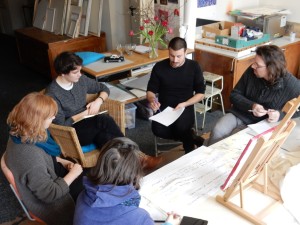
Inspired by the various questions that arose, we developed a workshop to go more into detail and to think about new ways and innovative alternatives to publish and share content. Beyond that we focused on the possibilities of transferring the knowhow about innovative practices to people who use audio-visual archives and/or radio archives.
Participants joined from Radio Student in Ljubljana, Central European University in Budapest, Radio FRO in Linz and Radio CORAX in Halle.
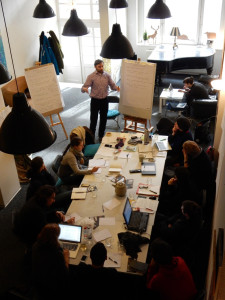
People might think of gramophone records and magnetic tapes, when they speak about historical recordings. Questions of digitalization accompany lot´s of institutions. After all everybody who deals with audio-visual material searches for efficient methods to preserve and maintain archival documents.
In this broadcast we give the example of a music digitalization project run by the Music Museum of Iran and the Center of World Music of the University of Hildesheim in Germany. The etnomusicologist Samuel Mund talks about his work as the technical coordinator of the project.
Andraž Magajna was digging out old broadcasting manuscripts of slowenian Radio Študent. In 2009 people at Študent were able to reconstruct the first broadcast from 1969. The story told by Andraž shows clearly, that the Community Radios on Europe not only have to ask, how they can publish contemporary content on the internet, but also how it is possible to archive material all around the processes, productions and activities of free radios to enable the Radiocommunity to write their local histories.
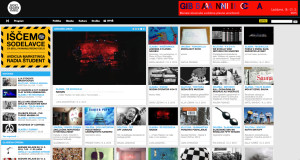
/Beim Stichwort historische Aufnahmen, mögen viele Menschen an Schellackplatten, vielleicht sogar an Wachswalzen denken. Die Frage nach der Digitalisierung, also Konservierung, von Tondokumenten ist in vielen Bereichen immanent. Die Frage, wie man audio-visuelle Inhalte in zeitgemäße Datenformate konvertiert begleitet jede Person, die Archive anlegt oder pflegt. Am Beispiel des Digitalisierungsprojektes, das das Music Museum of Iran in Kooperation mit der Universität Hildesheim durchführt, wird deutlich, welche Aspekte beim Überspielen der Datenträger zur Diskussion stehen. Der Musikethnologe Samuel Mund vom Center of World Music in Hildesheim koordiniert das Projekt von der technischen Seite her. Radio CORAX sprach mit ihm auf der Konferenz ARCHIVIA14 in Linz. Andraž Magajna holte alte Sendeskripte aus den Archiven von Radio Študent in Ljubljana und rekonstruierte die erste Sendestunde von Študent 40 Jahre nach Erstausstrahlung zusammen mit einigen der früheren Radiomacher_innen. Ein Teil der Ton- und Schriftdokumente aus dieser Zeit liegen in Sloweniens nationalem Archivs. Andražs Bericht macht deutlich, dass sich für die Freien Radios in Europa nicht nur die Frage nach der Online-Bereitstellung von aktuellen Interviews stellt. Der aktive Umgang mit und die Archivierung von historischen Dokumenten, die die Geschichte jedes einzelnen Freien Radios dokumentieren, ist mindestens genauso wichtig./
All the music played on the show can be found at freemusicarchive.org and is published under Creative Commons license (January 2015).
download
It was never before possible to access knowledge so easily as it is today. What is needed under these circumstances to make the utopia of open knowledge via Internet real?
Mikro.fm has been addressing the cultural anthropologist Manfred Faßler from the university of Frankfurt/Main with this question. Further we have been talking to Julia Fallon, Policy Advisor of the Europeana Foundation about legal questions concerning the metadata of the Europeana digital library. We´ll also give notice, that we have published a „Call for Pariticipation“ for the International Conference on Open Radio Archives that will take place in June 2015 in Halle/Saale, Germany. Submission is requested till end of January 2015.
/Nie war der Zugriff auf Wissen so schnell und so umfassend zugänglich, wie heute. An welche Faktoren ist die Utopie eines frei zugänglichen Wissens via Internet gebunden? Diese Fragen stellte mikro.fm dem Kulturanthropologen Manfred Faßler. Faßler ist Medienwissenschaftler und Professor an der Johann Wolfgang Goethe Universität in Frankfurt. Außerdem sprachen wir mit der Rechtsberaterin der Europeana Julia Fallon über die rechtlichen Prozesse beim Aufbau einer digitalen europäischen Bibliothek. Des Weiteren hören Sie einen Hinweis auf den „Call for Participation“ zur nächsten internationalen Konferenz über Freie Audio Archive im Juni in Halle/Saale. Bewerbungen sind noch bis Ende Januar 2015 möglich./
All the music played on the show can be found at freemusicarchive.org and is published under Creative Commons license (January 2015).
download
We want to encourage people involved in community media to present current broadcast and multi-media archiving practices at their stations and to generate ideas for an institutional structure for European community radio archives.
Community media across Europe face many of the same challenges in creating and managing archives of broadcast content. Every minute, they produce and broadcast an enormous amount of programming. But how is this content preserved and used after its broadcast? Most community broadcasters have created their own methodologies for preserving and cataloguing their programs: writing their own algorithms, adapting software to their needs, or developing complex file structures on hard disks, servers and cloud services. To make past broadcasting accessible to the public, some stations created systems to automatically upload programmes to their website or developed online archives which can be browsed or searched by program, subject or tag; others make use of collaborative archiving platforms like the Cultural Broadcasting Archive, or administer different “satellite” websites on specific subjects or aimed at specific communities.
Present and share your infrastructure solutions: At the conference we would like to explore and exchange different ways in which community media can preserve, use and share broadcast content. What tools and infrastructures to archive audiovisual material are best suited for community media? Which formats did your station find or create to present audiovisual content online? Which innovative techniques or tools did you develop or are you still looking for?
Archiving methods and archiving culture: A major challenge in building community media archives is how to cultivate archiving as an essential part of radio making. Many programme makers are focused foremost on their “on air” show. What are the best ways to engage them in archiving their programs and sharing them with online listeners? Who undertakes what task: uploading programmes, adding descriptions and tags, promoting them on social media? Are programs uploaded whole or split into specific items, with or without music, and how is the material edited?
The responsibility to archive: How can community archives integrate multilingualism? How can online archiving support programme exchange within Europe? What importance do analogue, physical archives have in the digital age, and how can community media secure and digitize them? How can community media archives unlock historical material about community life and social movements in user-friendly ways? Not least, we encourage proposals dealing with the question of copyright regulations and the role of open software and open knowledge.
For whom?
We invite and encourage programme makers and coordinators from European community media, radio activists, researchers, programmers and technicians to participate in the conference and submit proposals.
Formats of Presentation
We invite proposals for papers, workshops, discussions, presentations and radio shows on any subject related to “Radio Archives in European Community Media”. You can send in proposals in German, English or Spanish.
Proposals that engage the audience in active participation and discussion, or in trying out or evaluating archiving tools or strategies, are especially welcome. Participants can contribute to the conference in a variety of ways, not just by presenting a paper or hosting a discussion in 30-minute slots, or conducting a training or hosting a world café in max. 1 hour slots, but also by publishing a text in the conference reader, broadcasting or producing a radio show during the conference, or creating posters, web features or any other content you find suitable.
Submission
Please send proposals by January 31, 2015, to info@livingarchives.eu. Describe your proposed activity on not more than one page (including title and type of presentation) and include a short biography.
Presenters of accepted proposals will be informed by February 28, 2015. They will be invited to the conference and reimbursed for travel and accommodation expenses.
The conference will be live streamed. For further information please check
our Website: http://livingarchives.eu or
on Facebook: https://www.facebook.com/communitymediaarchives
You can find the Spanish language version of the call here.
Please spread the word!
The interviews were recorded at the the annual meeting of the Bundesverband Freier Radios (BFR) in Potsdam in November 2014.
Michael Nicolai says: “The decision which part of a show should be republished is an easy one – it can be everything beside the music, that is every self-produced content. The next question is of the quality – was this really a good interview? This depends on two decision makers: the one who makes the interview, who says ‘this was ok’ or who says ‘I don´t want to publish it, because I didn’t get to the point’ or whatever. And sometimes it’s me, the coordinator who decides. When I edit a show I consider, that 25 minutes live is catchy, but for the internet it´s sometimes better to publish 12 minutes and not the whole thing, because the podcast situation is different to the FM live-moment.” Michael Nicolai was talking about aspects of archiving at Radio Corax with Joost van Beek from the Central European University in Budapest.
In a second interview Helen Hahmann talked to Timo Stadler about the history of freie-radios.net, the platform started in 2001 and recently having more than 50.000 uploaded interviews. In the beginning the aim of this platform was to share programs between the German community radio stations. In the last years, it became an important platform for the radio audience too, who likes to listen to an interview again. After all, he states, it is an archive of social movements.
/Michael Nicolai sagt: “Die Entscheidung, welcher Teil eines Radioprogramms noch einmal im Internet zur Verfügung gestellt wird, hängt davon ab, ob ein Interview von der Person, die das Gespräch geführt hat, als gut genug zur Wiederveröffentlichung befunden wird. Ein Gespräch, das live 25 Minuten dauert und dabei lebendig und spannend für Hörende ist, wirkt nicht als Podcast. Deshalb ist es manchmal besser 12 Minuten komprimiert von dem Interview im Internet zur Verfügung zu Stellen.” Joost van Beek von der Central European University in Budapest sprach mit Michael Nicolai Anfang November auf der “Zukunftswerkstatt Community Medien” in Potsdam.
Das zweite Gespräch führte Helen Hahmann. Sie sprach mit Timo Stadler über die Geschichte des Online-Archivs freie-radios.net. Über 50.000 Beiträge sind im Archiv freie-radios.net seit 2001 abgelegt worden. Timo Stadler von Radio Querfunk in Karlsruhe sagt, “wir haben freie-radios.net erst mal als Austauschsystem gesehen, aber auch als weiteres Veröffentlichungsmedium, damit man interessante Textbeiträge nachhören kann. Es ist auch ein Archiv der sozialen Bewegung./
All the music played on the show can be found at freemusicarchive.org and is published under Creative Commons license (November 2014).
download
Following the article “Community radio broadcasters in Germany and online archiving: Are we there yet?” by Joost van Beek we talked to Ralf Wendt from Radio CORAX. He underlines the need of taking time to think about which content and which metadata the archive should contain as precisely as possible.
So that after archiving, the information can be sorted and spread further by special topics and interests. Helen Hahmann asks Ralf Wendt about the archiving infrastructure and archiving approaches of radio CORAX, and about other interesting radio archives.
The web archives mentioned in the show:
Xeno-Canto
Dokublog (SWR2)
Hörspiel Pool (BR)
/Anschließend an den Artikel von Joost van Beek „Community radio broadcasters in Germany and online archiving: Are we there yet?“ haben wir mit dem Programmkoordinator und Radiotrainer von Radio CORAX Ralf Wendt gesprochen. Er sagt, „ein Archiv wird vor allem dann interessant, wenn es sich um einen Pool mit präzisen Informationen handelt. Bei der Einrichtung eines Archives lohnt es sich, ganz genau darüber nachzudenken, welche Informationen man von den Daten erfragt.“ Ausgehend von einem solchen Archiv können die Daten dann je nach Spezialinteresse mit Videos, Fotos und Texten kombiniert werden. Helen Hahmann fragte außerdem, welche Infrastruktur Radio CORAX nutzt, um seine Radiosendungen zu speichern und welche spannenden online Radioarchive es derzeit gibt?
Die im Beitrag erwähnten Radioarchive:
Xeno-Canto
Dokublog (SWR2)
Hörspiel Pool (BR)/

All the music played on the show is published under Creative Commons license (November 2014).
download
Der Artikel „Community radio broadcasters in Germany and online archiving: Are we there yet?“ stellt fest, dass es den Webseiten der meisten Freien Radios in Deutschland noch an einer nutzer_innenfreundlichen Oberfläche fehlt, die es Produzierenden erlaubt Programme ins Internet zu laden, diese mit anderen zu teilen und für die Zukunft zugänglich zu machen.
Hervorgehoben wird, dass in Deutschland nur äußerst wenige Radios Archivierungsangebote von Dritten, oft kommerziellen Anbietenden nutzen müssen, um im Internet Programme verfügbar zu machen. So greifen in anderen europäischen Ländern einige Community Medien zur Archivierung ihrer Sendungen auf Soundcloud, Mixcloud oder iVoox zurück. Dies sei in Deutschland vor allem deshalb nicht nötig, weil mit der zentralen Plattform freie-radios.net eine wichtige, überregionale Archivierungs- und Austauschwebseite der Freien Radios existiere. Die Plattform suggeriere Besuchenden jedoch durch ihr Design, dass es sich um eine Austauschplattform handele, die mehr den internen Zwecken der Freien Radio Szene diene, als das Ziel verfolge, Inhalte für eine interessierte Öffentlichkeit bereitzustellen.
Analysiert wird der aktuelle Stand bei der Online-Archivierung und beim Online-Austausch unter den Mitgliederradios des BFR. Einige Beispiele werden genauer betrachtet, u.a. Pi Radio Berlin, Radio Unerhört Marburg, Freies Radio Wiesental, Radio StHörfunk, Radio Dreyeckland, Wüste Welle Tübingen, Coloradio Dresden, Radio Corax Halle und Onda „Agencia Radiofónica Latinoamérica-Europa“ Berlin.
Der Artikel „Community radio broadcasters in Germany and online archiving: Are we there yet?“ ist komplett nachlesbar HIER.
Die vollständige Studie wird im Juli 2015 veröffentlicht. Sie fußt nicht nur auf der Analyse von Archiv-Lösungen auf Radio-Webseiten, sondern auch auf Interviews mit Koordinierenden verschiedener freier Radios in ganz Europa, u.a. in Deutschland.
Joost van Beek, Kate Coyer und Helen Hahmann vom Projekt CAPTCHA, im Rahmen dessen die Studie durchgeführt wird, werden zur Tagung des BFR im November nach Potsdam kommen und bitten Euch um Feedback und weiterführende Hinweise.
Am 29. und 30. Mai 2015 findet bei Radio CORAX in Halle zum Thema „Praktiken des Archivierens in Europäischen Community Medien“ eine zweitägige Tagung statt. Für die Tagung laden wir Mitglieder des Bundes Freier Radios ausdrücklich ein, Vorschläge für Referats- und/oder Workshop-Themen einzureichen: info@livingarchives.eu.
Ongoing Captcha research focuses on identifying examples of good practice in community media archiving, through case studies and in-depth interviews. However, in order to get a more quantitative sense of overall, current practices, we also decided to look at all stations in one country and see what exactly they are publishing and sharing online, and how. Germany presents an instructive case.
ABSTRACT
This article tallies and describes the extent to which German community radio stations have engaged with digital sharing, at a time when an ever growing online audience is getting used to being able to find and listen to programs when and where it wants. Live streaming has become ubiquitous, but many fewer stations make a significant part of their individual programs accessible online for people to listen back to and share with others. Podcast feeds are available in some cases, but their user-friendly potential is underutilized.
Still largely missing is an optimally user-friendly model which more fully uses the opportunities that now exist to publish, share and preserve programs online. Only around one in five stations that belong to the national umbrella organisation of community radio organizations BFR makes it possible to access audio content by topic, program, and/or date – and some of those offer one or the other of these options but not all. Fewer still use topical tags or advanced search options.
On the bright side, few stations rely on commercial, third-party services to archive their files, especially in comparison with other countries. This may well be thanks to the existence of an online, BFR-run program exchange platform. This website, Freie-Radios.net, suffers from an outdated design and a lacking appeal to casual listeners, but provides an important archiving and exchange tool for especially the smaller German community stations, and the relative thoroughness of its archiving practices constitutes an example of good practice.
This review raises several strategic dilemmas bedeviling German community radio sites, and presents examples of stations which successfully navigated one or the other. How to expand existing options, such as podcasting, with relatively little effort? How to meet potentially conflicting needs and interests of different audiences, for example for archived information about all past broadcasts versus access to only audio content? How to marry an advanced level of archiving detail and customization with attractive, public- and mobile-friendly design? It does not yet address other dilemmas being explored in ongoing Captcha research through interviews at radio stations across Europe, such as how to involve, motivate and guide volunteer program makers in online archiving.
AUTHOR
Joost van Beek, Center for Media, Data and Society, Central European University
FULL ARTICLE
View or download as PDF file: Community radio broadcasters in Germany and online archiving: Are we there yet?
The audio-visual archive about the year 1989 in Halle/Saale (Germany) is called wendefokus.de: Throughout several months, the Free Radio in Halle, Radio CORAX, hosted very personal discussions and conversations about life in the GDR, and more specifically, about the idea that the socio-political conditions in the GDR necessarily demanded a substantial change. In these conversations, witnesses… Read more »
The audio-visual archive about the year 1989 in Halle/Saale (Germany) is called wendefokus.de: Throughout several months, the Free Radio in Halle, Radio CORAX, hosted very personal discussions and conversations about life in the GDR, and more specifically, about the idea that the socio-political conditions in the GDR necessarily demanded a substantial change. In these conversations, witnesses give reports about the way they perceived 1989, they tell us how they experienced the time between the fall of the wall and the “reunification”. They tell the story of citizens for whom the old laws no longer and the new ones were not yet applicable; of open spaces that got lost again; of the spirit that claimed GDR socialism was reformable; the story of the gap between individual experience and collective memory of this very period. Besides well-known personalities of today, the Radio Archive Wendefokus also offers a platform to people that are heard less often but nevertheless have a lot to contribute to this memory, enabling them to speak out about that time. The now-published discussions are supplemented on wendefokus.de by analysis and background reports.
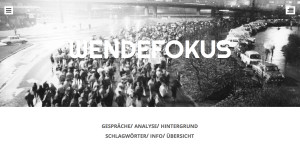
Das Oral History Archiv “wendefokus.de” von Radio CORAX über die Zeit vor und um 1989 ist online: Das freie Radio in Halle, Radio Corax, fragte über Monate in zumeist sehr persönlichen Gesprächen nach der Lebenssituation und der Vorstellung von notwendiger Veränderung der Verhältnisse in der DDR. Zeitzeugen und Zeitzeuginnen berichten über das Jahr 1989, erzählen, wie sie die Zeit zwischen Mauerfall und “Wiedervereinigung” erlebt haben. Sie erzählen von Bürgern, für die die alten Gesetze nicht mehr und die neuen noch nicht galten, von Freiräumen, die auch wieder verloren gegangen sind, vom Geist eines reformierbaren DDR-Sozialismus, von der Kluft zwischen individueller Erfahrung und kollektiver Erinnerung an die Zeit. Neben heute bekannten Persönlichkeiten Halles finden auch Personen Gehör, die sonst wenig zu Wort kommen und dennoch einiges zu erzählen haben. Ergänzt werden die hier nun veröffentlichten Gespräche durch Analysen und Hintergrundberichte.
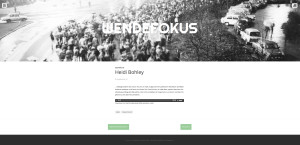
Press/Presseecho:
FREITAG, 28.10.2014, Wahre Demokratie von Michael Suckow
NEUES DEUTSCHLAND, 30.10.2014, Erinnerung und Unbehagen. Radio Corax hat Interviews online gestellt, in denen Zeitzeugen über das Ende der DDR reflektieren von Ralf Hutter
Kraftfuttermischwerk.de, 7.10.2014, Über 100 Interviews: Radio Corax’ Wendefokus – Persönliche Blicke auf den Herbst ’89
Hallesche Störung, Wendefokus geht online
CAPTCHA Radio Show #6 is a review on the ARCHIVIA 14 conference in Linz in September 2014. We talk to Tamar Millen from the Community Media Association (UK) and to Joachim Losehand from Radio FRO in Linz about copyright challenges for archiving online and their approaches to store and share shows produced in Community Radios. The broadcast is partly in German and partly in English.
/Mit einem Rückblick auf die Konferenz ARCHIVIA14 greift diese Radiosendung zwei zentrale Fragestellungen an Freie Archive auf. Welche Wege müssen verhandelt werden, um lizensierte Materialien im Rahmen von nicht-kommerziellen, freien Archiven der Öffentlichkeit zugänglich zu machen und wie kann das Archivieren von Inhalten von der Öffentlichkeit selbst mitgestaltet werden? Kommt man künftig ohne Archiv-Koordinierende aus? Dazu hat Helen von Radio CORAX mit Tamar Millen von der Community Media Association in Großbritannien und mit Joachim Losehand von Radio FRO in Österreich gesprochen. Die Radiosendung ist zweisprachig in Deutsch und Englisch./
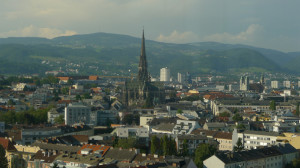
The original language version of all lectures are available in audio:
http://www.archivia.at/nachhoeren/
…and in video:
http://www.archivia.at/videos/
All the music played on the show is published under Creative Commons license (September 2014).
download
After focusing on special aspects of archiving for community media we can hear about the archiving methods of the German public broadcasting services, especially about the archiving structures of Bayrischer Rundfunk.
In dieser Sendung gibt es den zweiten Teil eines Gesprächs mit Helen Hahmann zu hören, der Projektkoordinatorin von CAPTCHA. Gesprochen wird sowohl über die Besonderheiten eines möglichen zukünftigem Archivs als auch die Schwierigkeiten derzeitiger Methoden. Dabei beginnen die Gesprächspartner leicht zu philosophieren und begeben sich auf die Suche nach einem Bündel an Fragen.
Der zweite Teil der Sendung ist ein Einblick in die Archivmethoden öffentlich-rechtlicher Rundfunkarchive. Zu Gast war Oli Löwe, der von seinen Erfahrungen beim Bayerischen Rundfunk berichtete. Im Gespräch danach berichtete er von einer möglichen Entwicklungswege von Archiven. Neben einer virtuellen Bibliothek etwa für *.pdf Dateien sprach Oli über einige anderen spannenden Bereiche des Archivwesens, etwa auto-mining.
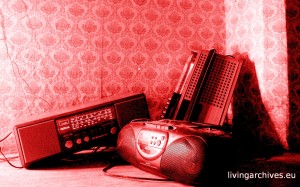
All the music played on the show is published under Creative Commons license (August 2014):
Steal 4 Ram – Crash
Sphere – Deleted
Misstrabant – Fabrik; Bicocca; Delete
A Ninja Slob Drew Me – Cut; Student Gene Pool
Macaco Mao – 2Lcohen expensive; 4delete delete; Wired
Torley on Piano – Brilliant ideas
Delenda – Voices; Answers without words
Dead Channel – Delete
Tempus Fugit – Cut paste and delete poetry
Nocom Electro – Hic
download
If you can not be there in person you will still be able to follow the conference online. All talks and panel discussions (audio and video) will be streamed live. All sections will be either held in English or translated to English. Click for the detailed programme and the address of the streaming site.
At the intersection of the authors’ rights and the public’s interest in free access to information the ARCHIVIA 14 conference will raise questions on legal and cultural-economic challenges and solutions for online archives. With workshops, presentations and talks ARCHIVIA 14 will open a forum for current challenges and timely solutions.
Conference programme (Location: Wissensturm)
6th September 2014
9:30 AM
Registration and breakfast (with friendly support by Open Commons Region Linz)
10:00 AM
Welcome and introduction
10:30 AM
Brave new world! Challenges and strategies of online archives and repositories (Maria Seissl, Head of the Service Department for Libraries and Archives at the University Vienna)
11:30 AM
Workshops
12:30 AM
Workshops
1:30 PM
Lunch break
2:30 PM
“Preserving cultural heritage in the digital information society” – Panel discussion about the actual practices of archives, media centers and libraries with Gerhard Baumgartner (Dokumentationsarchiv des österr. Widerstands), Julia Fallon (Stiftung Europeana), Max Kaiser (Österreichische Nationalbibliothek) and Hermann Lewetz (Österreichische Mediathek). Moderation: Anna Masoner (ORF Ö1)
7th September 2014:
10:00 AM
Registration and brunch
10:30 AM
A National Library for the 21st Century – Content and services in The Digital Library (Roger Jøsevold, Nationalbibliothek Norway, Oslo)
11:15 AM
Copyright and cultural heritage – a construct between reality and fiction (Paul Klimpel, iRights Lab Kultur. Berlin)
12:00 AM
Memory institutions, online archives and copyright (Felix Trumpke, OLG Frankfurt/Main)
12:45 PM
Lunch break
1:45 PM
Mass-digitization and (extended) collective licensing: the way forward? (Stef van Gompel, Institute for Information Law, Amsterdam)
2:30 PM
Electronic Reading Terminals – ECJ Case TU Darmstadt vs. Eugen Ulmer in its European Context (Diana Ettig, Hogan Lovells, Frankfurt/Main)
3:30 PM
“New framework conditions for the accessibility of cultural heritage” – Panel discussion about the legal framework conditions and the possibility of their improvement in the digital information society with Diana Ettig (Hogan Lovells, Frankfurt/Main), Stef van Gompel (Institute for Information Law, Amsterdam), Roger Jøsevold (Nationalbibliothek Norway, Oslo), Paul Klimpel (iRights Lab Kultur, Berlin) and Felix Trumpke (Legal intern at OLG Frankfurt/Main)
Moderation: Leonhard Dobusch (Professor for organisational theory, FU Berlin)
You can follow the talks and panel discussions online on http://www.archivia.at/live-streaming/
For more information please visit http://www.archivia.at/?lang=en
During the last six months in the CAPTCHA project we have been looking for sustainable archiving solutions for community media. Helen Hahmann from Radio Corax is coordinating the whole project and regularly communicates with the partner organisations.
She talks about the beginning of the project, the achievements and challenges so far and about the future. It becomes clear that the freedom of not having everything defined in advance doesn`t necessarily make things easier.
In this radio show we also pay a visit to a private CD archive with an unusual method for arranging its content: electronic to acoustic, serious to cheerful are the criteria that define the place where a CD belongs. We asked the owner how effectively this method works.
/Seit knapp einem halben Jahr suchen wir im Rahmen des Projektes CAPTCHA nach nachhaltigen Archivierungsmethoden für Community Media. Helen Hahmann von Radio Corax ist die Projektkoordinatorin und steht regelmäßig in Kontakt mit den beteiligten europäischen Partnern. In der folgenden Sendung spricht sie über die Anfänge, bisherige Erfolge und Schwierigkeiten sowie den künftig zu beschreitenden Weg. Dabei wird schnell deutlich: dass nicht alles vordefiniert ist macht es nicht unbedingt leichter.
In dieser Sendung besuchen wir weiterhin ein privates CD-Archiv mit einer besonderen Methode den Inhalt zu arrangieren: Elektronisch bis Handgemacht, Ernst bis Heiter sind die Kriterien welche den Standort bestimmen. Wie effizient das ist wird nachgefragt./
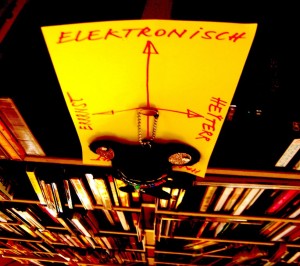
All the music played on the show is published under Creative Commons license (July 2014):
Akashic Records – Grooving Robot
JCRZ – Dialing to Nowhere
Social Bot – Death Machine
Revolution Void – Ode to Sun Ra
Carl Andre – In The Machine
Marius Joppich – Glockenspiel
Emorej – Twitch
Quantum robot – Happy outro Dance dance little robot
Social Bot – Head Cold
Pornophonique – Sad Robot
download
CBA is a hosting service for independent and noncommercial radio stations in Austria and beyond. Since 1999 the number of available audio files increased constantly and until June 2014 it reached more than 45.000 pieces – which huge amount of audio data could be completely listened to in approximately four years if played nonstop. Beside the audio files the platform preserves various further data like pictures, videos or text documents.
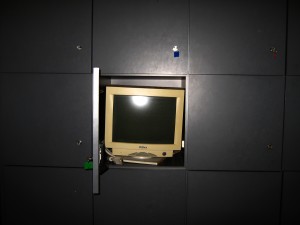
In this radio show CBA (Cultural Broadcasting Archive) activists Thomas Diesenreiter and Ingo Leindecker tell us about the past and present challenges regarding programming and maintaining this exchange-platform. Beside topics like solutions for long term preservation and copyright issues in Austria they speak about their experiences with commercial hosting services. Last but not least questions are raised about their plans and commitments within the CAPTCHA project.
download
All the music heard on the show is published under a Creative Commons license (June 2014):
Delenda – True
Delenda – Urban dictionary
Delenda – Good time
Delenda – Baruc
Arbalord – Lo
Starlight – Nouvelle aventure
CEU researcher Joost van Beek talked with several participants and hosted a small discussion session for community media practitioners to talk about how their stations share their programs online, what issues they face, what tools they use, how they organize the work flow and what lessons they have learnt.
The practitioners from Denmark, Switzerland and Austria who took part in the session discussed challenges related to the differing scope of copyright that applies online, the advantages and disadvantages of having designated (staff) persons take on the responsibility for archiving versus encouraging all volunteers to upload their programs, and successful strategies for motivating and training volunteers to do so.
Most of all, the discussion brought home how divergent the capacities of different stations are, and how ‘best practice’ recommendations must be tailored to existing possibilities, however modest. Working on a non-profit basis with mostly volunteers, community media have to grapple with particularly pronounced choices in how, what and where to archive. In this context, attendees discussed the tension between the practical advantages and strategic disadvantages of using third-party online services like Soundcloud, Mixcloud and Vimeo.
Such services provide easy-to-use, low-cost ways to upload and share materials, which can function as convenient shortcuts when the time, cost and know-how required for archive and website design, volunteer training and hosting packages are in scarce supply. They also provide low-threshold statistical info and sharing options. Their limited categorization options are geared for sharing rather than archiving purposes, however. Perhaps most importantly, relying on such services means a station becomes dependent on an external, commercial party for the online preservation and availability of its programs as well as the living archives built around them, from tags to audience interactions. The long-term existence of these services is not guaranteed, as MySpace has demonstrated, and instead of being able to freely develop new archive functions or interfaces, a station becomes in part reliant on corporate development choices beyond its control.
Nevertheless, their attraction for especially small community stations is self-evident, and their use fits within a broader trend of even much larger organizations delegating functions like search and mapping on their websites to commercial third-party applications. Moreover, even if a station doesn’t use them officially, individual program makers will, potentially creating diasporas of content. The experience of one of the stations attending the small discussion therefore underlined the need to make consistent choices about what to upload where, use embedding options to optimize the accessibility of programs, and present clear information to website visitors.
You can find the photo documentation of the Civilmedia14 UnConference here.
It will bring together experts and representatives from the academic and political world, from both Austria and elsewhere in Europe, to discuss the precarious situation of online archives. Operating in a dynamic, yet to fully develop field where copyright protection and the public right of free access to information meet and clash, these archives face a range of legal, cultural and economic challenges. ARCHIVIA 14 presents a forum with lectures, panel discussions and workshops to discuss topical issues and develop concepts for solutions.
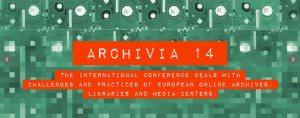
Focus on European projects
In 2012, the ARCHIVIA conference already focused extensively on the challenges of digitizing archives, and the impact of digitalization on the legal questions surrounding archive material. This year, Archivia 2014 will in particular highlight examples of current and past online archiving projects from around Europe, what can be learnt from these experiences, and what best practices can be identified.
Invitation for participation
ARCHIVIA 2014 invites private and public libraries, museums and archives from all over Europe to take part. Come share your ideas and experiences on how online archives can deal with the challenges at hand, present your plans and projects, and discuss possible solutions and scenarios going forward! The conference will address both a professional audience and the broader, interested public.
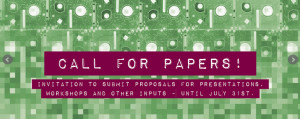
Online archives for cultural diversity in Europe!
The conference aims to increase public awareness of the social relevance of digital online platforms in Europe. In our view, online archives will be a key tool for the dissemination, preservation and promotion of the diverse cultural heritage of Europe in the future.
Submissions
Proposals for lectures or workshops, containing a title and an abstract of no more than 250 words, should be submitted in English or German (preferably as PDF file) at http://www.archivia.at/?lang=en. The submission deadline is 31 July 2014. For more information, contact Dr. Joachim Losehand, office@archiva.at.
The Dublin meeting was organised and hosted by project partner Near Media Co-Op, who brought together several stakeholders from different organisations interested in topics regarding online archiving.
NearMedia invited to a workshop in Dublin. The topic: “What is worth archiving”. More than 50 people from various social, cultural or political institutions participated and discussed.
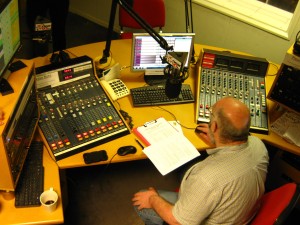
In this show you will hear some acustic impressions from Dublin, eg. the visit of the community radio NearFM, whose founder Jack Byrne (NearMedia) reports about the history of the station. Gavin Byrne (NearMedia) tells us how NearFM is archiving their shows and introduce us in the online podcasting system.
download
Near TV filmed and edited a video of the half day event presented in Dublin – with some snippets of interviews with different people, people from the CAPTCHA team among others.
Near Media Co-Op in Dublin presented 29th april 2014 a half day seminar to discuss what is worth archiving and look at approaches to archiving. The event was particularly relevant to community and minority groups not represented in mainstream archiving.
Programme of the Seminar “What is worth Archiving?”
09.30am – Registration with tea/coffee
10.00 – Chair of the event Ciaran Murray welcomes attendees and introduces the opening address from Kate Coyer from the Central European University in Budapest
10.15 – Continuing to build a digital repository for Ireland and ways of prioritising material – Sandra Collins from the Digital Repository of Ireland
10.30 – Connemara Community Radio Archive – Grainne O’Malley
10.45 – The BAI Archive Scheme – what it is, what it does, how it can apply to you? Elizabeth Farrelly
11.00 – The Importance of Local – Jack Byrne of the Near Media Co-Op
11.15 – Question & Answers, audience & panel.
11.35 – Break for coffee
11.45 – Round table facilitations for comment feedback on what has been discussed so far
12.15 – Break
12.30 – Workshops – Choice of 1) Podcasting with Gavin Byrne or 2) How Machines Find Us with Dave Knox
13.15 – Reconvene for compilation of comments/feedback/ review – this will form a report on the mornings activities for the CAPTCHA EU Culture Initiative
13.30 – Lunch (served in the bar, first floor of Teachers Club)
Speakers of the Seminar “What is worth Archiving”
• Chaired by Ciaran Murray, Near Media Co-Op Overall Coordinator
• Jack Byrne, former chairperson, Near Media Co-op and former President, AMARC Europe (European association of community media broadcasters)
• Kate Coyer is the Executive Director of Central European University’s Centre for Media and Communication Studies in the School of Public Policy.
• Dr Sandra Collins is the Director of the Digital Repository of Ireland (DRI).
• Elizabeth Farrelly – Broadcasting Authority of Ireland
• Grainne O’Malley – Station Manager, Connemara Community Radio
• Gavin Byrne – fulltime IT coordinator with Near Media Co-Op
• David Knox – Media Scientist
Workshops of the Seminar “What is worth Archiving?”
1. Podcasting by Gavin Byrne
Gavin Byrne guided us through a ‘step by step guide to podcasting’ via WordPress. From installing a client to saving the file as mp3, uploading the audio, loading content such as text and visuals and tagging. This was a comprehensive guide in how to make a successful podcast. Gavin also covered audio hosting services soundcloud and mixcloud. Near FM have an extensive library of podcast material available at www.nearpodcast.org
2. How do Machine’s find us by David Knox
This workshop looked at how users find information on the internet, how they search and in turn how search engines work. It highlighted how and why search engines considering data (text/sound/video files etc) “good” or “worthy” and how they weigh the validity of this data. It also looked at how a user will submit data to a website so that it is found.
50 people attended the event from 26 different Irish and European organisations like community radios and TVs, archives, universities, libraries, museums and others.
Even nowadays, although the internet is not a new phenomenon but the now leading technical medium, many problems especially in the fields of copyright are still unsolved. Especially for this reason, the makers of the CBA founded the conference Archivia in 2012, which aimed not only to put a spotlight on Europes free media archives. It also pursued a long-term goal in connecting different media archives to find a common ground for political action. The funding of this EU project was a direct result of this action.

The conference convened by the Austrian Association of Independent Radio Stations (VFRÖ) and Radio FRO in the context of ARS Electronica Festival 2012 (The Big Picture) was held on 31 August and 1 September 2012 in the Wissensturm Linz.
Since digitization, much has changed in the structure of information and communication. One of the strongly affected areas are archives. What was discussed was not only the technical implementation and durability of digital archives, but also their social function. Whereas for a long time, archives were accessible only to a limited public and consequently irrelevant for the chain generating royalties and revenues, digitization and, above all, the internet offer the potential for opening up archives to the public worldwide.
Whether these archives, made available worldwide, impair the chain generating royalties and revenues or not depends upon the content made accessible; a film archive available worldwide can impair the generation of royalties and revenues, just as it can do in musical or literature (e-books). Other archives, such as radio station archives, can be made available to the public without disturbing generation of royalties and revenues from the materials used (the inputs). If, for example, music is played in the background of a conversation, or even simply played on the radio in the program-breaks, presumably no one would listen to the radio program in the online archive instead of buying the CD or MP3 file.
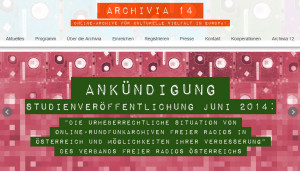
Especially in the area of public radio and independent, non-commercial radio stations, a question arises concerning the sense of copyright barriers to access. In both cases in Europe, public financial means are deployed to produce the programs because they are regarded as being socially relevant. Because of copyright limitations relating to making content available on the internet, however, providing open public access to program archives is highly restricted and, in many cases, practically impossible. Even though public moneys are deployed and the use of relevant program-content for linear transmission (terrestrial transmission and live-stream) is appropriately remunerated, apparently, permanent availability is still not possible. The private interests of the copyright owners (even though the potential for generating royalties is not curtailed) are placed above the public interest in information which is manifest also in the statutory public assignment and the public financing of non-commercial, independent radio stations.
At Archiva 2012, problems with archiving content or making it publicly available were illuminated and potential solutions discussed in workshops. Renowned keynotes by scientists, philosophers and experts like Manfred Faßler, Ruth Towse and Till Kreuzer threw light on the problem from the perspectives of media studies, economics and the law. The contribution from media studies showed the social function of archives, the significance of public accessibility and changes thereto in the past two decades. The contribution of economics concentrated on possible inefficiencies and problems of welfare economics triggered by copyright. And the contribution of jurisprudence elucidated the current situation and discussed the prospects for possible solutions, such as the introduction of statutory licenses.
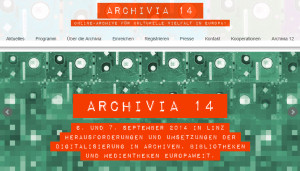
The conference Archivia 2012 brought together opinions and positions of operators, both in Austria and internationally, of archiving and internet projects, statutory public and independent, non-commercial radio stations along with players in diverse fields of art, media and academic disciplines as well as politics. The conference bundled together shared interests to gain an orientation in current academic and political discourse, and to form alliances across the broad spectrum of digital archives. ARCHIVIA 12 was the starting-point for a networked political effort in the sense of creating such political boundary-conditions that appropriately take into account contemporary utilization and the generation of royalties and revenues from the digital cultural heritage.
Two years later, the Archivia 2014 will continue this broad discussion and focus on practical solution strategies. It will be held on the 6th and 7th September in Linz in cooperation with the Ars Electronica Festival.
Writing a description for media is an odd thing. Although the internet is awash with visual and sound resources, it’s searches have a heavy bias towards the written media. At present, it’s (almost) impossible to search within an item of media, be that sound, photography or video. We then depend on text to describe it.
As with most media production, producing your pre-production is always concerned with the who, where, what, when and how of the production. These questions in planning, are also exceedingly important when distributing your content afterwards. You need to know who your subject is, what they will talk about, where the interview will be held etc. These things will go a long way to describing your media. No matter the site you’re submitting to, or the type of content, the vast majority of these rules apply.
The major search engines all work in a very similar matter. They search for valuable content and their criteria for what is deemed valuable, is very similar and simple. They will want, and as a result you will want your content to be well ordered and well formatted. You want the sentences to be short and legible (see Flesch-Kincaid readability test). And start at the start.
The most valuable information for search engines is at the beginning; the title, the first sentence, the first paragraph. The focus of the description should be mentioned in these and throughout the body of the text. The focus of your media should also be the focus of your description.
Writing a Title for a Media Description
Often when titling a piece of art or media, there can be a tendency to write the title in an abstract or ethereal manner, describing a sense of the piece rather than the content itself. If you think of film titles, often they have no direct descriptive relationship to the content of the film. For the purposes of search, unless someone knows exactly what they are searching for, these are largely useless.
The focus of the media should be clearly outlined in the title. The title will be considered, by most searches, as the most important signifier of what the content is. If your piece is on interculturalism, the syrian conflict or whatever this should be contained within the title. Put yourself in the mind of the searcher. How do you connect your audience with your media and what will they be looking for? Always be: think of the who, what, where, when etc.
If the media is part of a series, put the series name in the title. If it is part of a larger event, add that also. Connect your media to other media items by relating themes, events etc. Ask yourself, what will people who are interested in your content be looking for? Theoretically your title can be as long as you like, at least as long as the word count that is imposed by the site you are using. In the case of a title, attention should be paid to how the results are listed. If we take the example of Youtube: you will notice that when results are listed, if the title is longer than 60 characters (give or take) with spaces, the title then becomes clipped. If your title is longer than that limit, order the title with the most valuable information for the viewer first.
Writing the Description
When writing the description of media, reiterate the key points that are used in the title: the focus of your media. If the characters that appear in the piece are renowned in their field, use their name, their title or their area of expertise as it relates to the piece. Mention the key points that are raised within the piece. It is not uncommon for almost entire transcriptions to appear within a description.
To increase the likeliness of being found, your description should hammer home whatever the focus of the media is. In search engine optimization terms, the density of your keyword focus can be very important. If we take for example the focus of your piece is interculturalism, you will want to mention this word in your title and in your description. For the purpose of this example, the word ‘interculturalism’ is the focus of your piece and thusly the ‘Focus Keyword’. Keyword density should be 1-3%. Less than that and search will not consider your piece as being about interculturalism, any more than 3% and search engines can consider your piece as spam. It will assume that you are attempting to cheat the system. The focus of your description should also relate to the title so there is coherency between the two.
Always keep in mind the focus of your media and relate that to your description. Repeat that word or phrase. Always keep in mind the who, what, where, when etc. and think then of how people will find you.
The presentation given by Olli Löwe during his CAPTCHA-Workshop “Technical Archiving Infrastructure” is dealing with different audio-storing solutions between depot, database and archive.
With the launching of the BBC World Service Prototype in 2012 a collection of more than 50000 pre-recorded BBC radio programmes from the 1960’s have been made accessible online. The collection is available thanks to an innovative way of processing and managing content by combining machine and human resources.
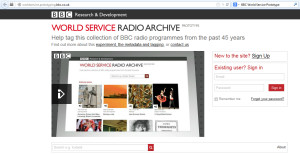
The prototype has been developed as part of the cooperation project, Automatic Broadcast Content Interlinking Project (ABC-IP), between BBC Research & Development and MetaBroadcast. The idea behind the project is to roughly tag the content automatically and then let the audience do the fine tuning.
The content is processed by an audio-recognition software that makes the first attempt to identify the relevant topics (in some cases the links that have already been associated with the programmes). They use linked data to tag the content, whereby all content tags correspond with wikipedia articles, speakers, series-names etc..
In the archive the radio shows are presented with the automatically received tags from the audio files, the file description and some automatically associated images from Ookaboo. The algorithms obviously do not work perfectly so the tags are not always fitting the content. The show on the death of Pope John Paul II is, for instance, linked with the horror movie “Shock Waves” because in the description you can read: “Death of the Pope and the shock waves around the world.” These mismatches are to be corrected by the users.
After signing up with name and e-mail you`re invited to work on the metadata of the content by voting up or down some automatically generated topic tags, name some speakers, work on the description, recommend another picture or add more tags.
When editing the description you can always click the “see history” button. Here you can follow the changes and restore to the original version. If you name an unknown speaker or are editing an existing speaker you don´t see any histories, you can change the names easily. When changing a name of a speaker in one show you change the name in all shows, which have been connected to the same person (ID). Here I made a mistake: wanting to try out the function I just renamed an identity and after I had completed, I started to search for the option to reverse the changes – there was not such a thing. (Sure, I could rewrite the original name, if I remembered… Sorry.) It is also impossible to reverse by recommending a “better image” to illustrate the show.
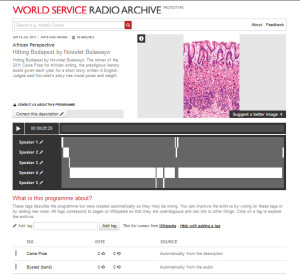
Adding a tag is not so easy. Starting to type in a word you get recommendations of phrases which are corresponding to Wikipedia-pages. You cannot just type in anything, so if you don´t find the phrase you were looking for and you stick to the tag-idea you have, you have to create a Wikipedia page to be able to correspond with your tag.
Summing it up so far I guess we see an option which is worth thinking about for community media archiving purposes. For those who might be fit in technical aspects here is a short description. After seeing how users can help improve the archive, let´s have a look at how and what for they can use it for.
If you only want to explore the collection you just give in a search term, open an item and start to navigate between shows through thematic links, series, speakers, etc.
The searching options are quite poor. You can not search by author, by running time, by location or by dates, you only search by searching terms. The result of your search is filtered by decades and availability (some shows are unavailable because of technical reasons or copyright considerations). It is not easy to tell how the results are listed. It`s neither chronological, nor alphabetical, it is not happening upon popularity not even upon the content identification number. Not to mention that you don`t have an opportunity to list the matches upon some criteria (author, running time, publication date etc).
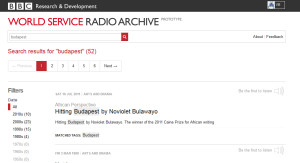
It is also not easy to understand how searching with multiple search-terms functions. If you search “Budapest” you receive 52 matches. If you search “Budapest” and “hotel” you receive 56 matches, some of them are tagged with “hotel”, some with “Budapest”. I didn`t find any double match (I admit I didn`t go through all of them though). So maybe there are only 4 of all content pieces tagged with “hotel”? Not at all: for “hotel” you get 357 matches!
Search operators known from google like “” for the exact term or “OR” for a search for either word are not accepted here either.
If you are looking for something definite the chances of finding it, without reading the summaries of hundreds (or in some cases thousands) of items, are slim. This is not very motivating even if you know your contributions are supposed to improve the archive, not only the “correctness” of the metadata but through a feedback circle also in the searching and navigating options. Besides these shortcomings on user-friendliness I missed the comment, or other content evaluating options, which are also basic things on community managed sites for sorting items (by popularity for instance).
Summing it up: BBC World Service Prototype shows a nice example for crowd content managing possibilities, which is without a doubt highly relevant in community media context. However, when thinking about a similar system we have to be critical towards its lack of effective usability and develop a system matching our purposes. We need to provide real, effective access to our contents – and always be aware of what the users are interested in.
In November 2013, community radio activists from Austria, Germany and Ireland met with academics from Central European University in Budapest, Hungary, to launch a project about how community media can best use and develop online archives.
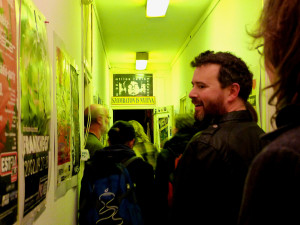
The necessity of sustainable archiving has been a subject of discussion for the civil media community for a few years now, and the project, called “CAPTCHA – Creative approaches to living cultural archives,” aims to provide new insights on how to securely make community media content accessible online. The project encompasses both research in best practices and the development of a model for archiving.
In the first CAPTCHA radio show about the first CAPTCHA project meeting, you can hear impressions from the exchanges that took place during the meetings and from excursions to Radio Tilos, the famous independent radio station in Budapest, and the Open Society Archives. During the 62 minutes of this program, questions are raised like: How are you archiving? Who is using the content? What do you think about the cooperation of the European community media at the moment? What will community media look like in 20 or 50 years?
download
The following people appear: Virág Bottlik (Radio Corax, Halle), Gábor Csabai (Tilos Rádió, Budapest), Kate Coyer (Central European University, Budapest), Thomas Diesenreiter (Radio Fro, Linz), Helen Hahmann (Radio Corax, Halle), Gabriella Ivacs (Open Society Archive, Budapest), David Knox (Near Media Coop, Dublin), Paul Loughran (Near FM, Dublin), Franziska Stübgen (Radio Corax, Halle), Georg Wellbrock (Radio Corax, Halle)
The main question of the workshop is “What is nessesarry to create an archiving infrastructure within a community radio”? Which tools consider the specific circumstances of open knowledge production by media actors and artists? The workshop is conducted by the computer scientist and scientific documentalist Oliver Löwe from University of Freiberg. He introduces the participants to archiving tools and strategies of the public radio and public libraries. The goal of the meeting is to outline the requirements for a database tool, that considers the demands of open knowledge actors like the free radio station CORAX.
The CBA, the Cultural Broadcasting Archive, is an open media platform founded in 1999 by Radio FRO. Later the project was taken over by VFRÖ, the Association of Austrias free radio stations, as a joint effort to claim their space in the digital sphere and provide an effective tool for collaboration and sharing of media content.
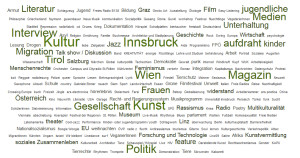
The CBA pursues similar goals as its founders: open access, participation, common public interest, non-commerciality, transparency, self-organization, local and regional development and independence. Furthermore the project follows ethical principals in the pursuit of a self-determined, solidary and emancipatory society.
Today, fifteen years after its start, 25 radio stations with 800 user accounts upload parts of their programs onto the CBA, mostly audio content with text descriptions and semantic categorization. 43.000 audio files with a total length of 32.000 hours tell a diverse story of a societies successes and struggles often overlooked by mainstream media. With a steady and exponentially growing listeners and user base, the CBA is becoming a more and more important online platform for the active civil society in Austria. From the beginning, all the content on the CBA was available for free and it was one of the first platforms to adopt the Creative Commons license on a wide base. Therefore most of the content is available to remix and reuse, for example by other radio stations or for artistic usage. Another important role plays the idea, that information not only needs to be open, but needs an open environment as well. Due to that, the CBA uses only open source software, releases its own source code under a free license and is hosted by a free, independent and local community hoster.
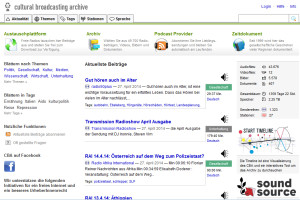
Due to its pioneering role, the project team behind the CBA often had to ask questions and hunt for answers about the challenges of a changing media landscape due to the success of the internet. Over the years, many scientific and legal papers had to be written and many events and conferences were organized to discuss urgent political, legal and technical questions. Even nowadays, although the internet is not a new phenomenon but the now leading technical medium, many problems especially in the fields of copyright are still unsolved.
As first component of the research, the Center is investigating and evaluating examples of collaborative online archives and interfaces, which either present community media-produced and -curated content or provide useful models relevant to community media. Through desk research and case studies, the researchers want to explore both past and current models, reviewing the scope of content and features offered as well as issues of structure, design, navigation and interactivity.
A particular point of interest is the experience and prospects of international projects and archives. This review will help identify best practices – as well as examples of practices that have not functioned as well.
A significant part of the research, however, will focus on processes and practices as well as products. How have successful models of functioning archives been realized? The Center is conducting interviews with people who have been directly involved with planning or building online archives, and with community media volunteers who work with them on a day-to-day basis as producers, editors or administrators. How do they organize the archive? Who plays what role in the archiving work flow? What training, guidance, moderation or archiving policies are needed? This way, we want to identify and evaluate different models of planning, action and collaboration. Specific attention will be paid to the question of how to develop archiving platforms and formats in sustainable ways, avoiding the pitfalls of project- and funding-dependent temporary initiatives, and taking into account the volunteer-based nature of community media.
In order to evaluate the success of community media archiving models and the needs they need to meet, the Center will conduct survey research to recruit feedback from community media viewers and listeners as well as those actively involved themselves. What are their expectations from community media streams, downloads and archives? How do they use and interact with the sites, and how do they experience the ease of design and navigation of the site or sites they visit? What are their frustrations, and what would they still like to see?
All research will be practice-oriented, tailored to the needs of community media practitioners and activists, and will be driven by the information needs that emerge during the workshops that are at the heart of the project. The research should be able to identify the specific priorities in access, process and presentation that apply to community media. It aims to arrive at recommendations that can inform the work of community media organizations which are planning to launch an online archive, or expand or review the archives they already run, as well as individual community media producers.
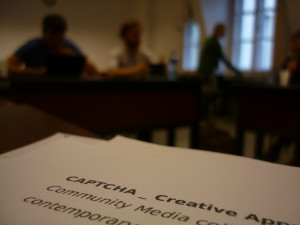
The first meeting of the project partners within CAPTCHA addresses the essential questions to open multimedia archives. What are the specific circumstances of the “open knowledge” sector to archive productions? How can free media actors and artists publish their contents to gain public visibility? Which social practices of multimedia actors should be displayed and investigated by the CAPTCHA research? The partners develop the thread for a qualitative questionnaire. The questionnaire will be the base for the research conducted by Kate Coyer and Joost van Beek in 2014.
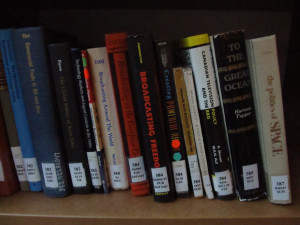
Every day, local citizens across Europe are producing hundreds of community media programs, broadcast on non-commercial, participatory TV and radio stations. They are creating a range of content of immense variety. The news and current affairs programs they make tackle issues like migration policy, political education, cultural diversity, European integration and many other topical subjects. At a time of increasing concentration of commercial media ownership and strains on public service broadcasting, the European Parliament has recognized the important and significant role of independent community media. Their work bolsters Europe’s media pluralism, empowers citizens, fosters social inclusion, enriches social debate, and provides valuable training and skills.
The growing array of socially relevant content they produce constitutes a vast knowledge resource, and an effective use of it could buttress people’s right to freedom of expression and access to information. Unfortunately, many of the programs which community media produce are only broadcast once and become unavailable to the public after that, since the mostly volunteer-based, non-profit stations face specific limits and dilemmas when it comes to creating and managing online archives.
The goal of the project CAPTCHA is to empower community media, and the media producers working there, to increase the accessibility of their programs, by promoting the exchange of content and exploring sharing platforms, tackling the economic, technical and legal issues they face, and increasing awareness and practical know-how about the digital tools that are available now to facilitate collaboration and accessibility.
The project will review and analyse existing strategies community media are deploying to create and use archives, and identify examples of best practice. During workshops and conferences, experts and practitioners will discuss the economic, legal and technical aspects of archiving, including questions of copyright and fair use. In the course of the project’s events and collaborations, we will explore innovative and sustainable methods of facilitating the storing, editing and using of community-produced audio and video materials in collaborative and democratic ways, and develop a new, open source tool to facilitate archiving interfaces. The project partners will produce and share thematically related broadcasts, run a project site with findings and useful examples and materials in different formats, and publish project results in print as well as online. We welcome the input of media producers, researchers and consumers alike.
EXAMPLES FOR CREATIVE ARCHIVES
CAPTCHA Radio Shows #1 – #20: available on cba.fro.at; Radio CORAX, Halle
Living Archives: An oral reflection of North Dublin; NEAR Media, Dublin
Songs of Dublin; David Knox, Dublin
Wendefokus Archive: An oral history of the year 1989 in Halle/Saale; Radio CORAX, Halle
radiocorax.de Archive: A new way to display radio content; Radio CORAX, Halle
[still in process]
VISUALIZATION TOOL
UVisualize! – An easy to use yet powerful visualisationtool for WordPress; Radio FRO, Linz
STUDY
Community radio broadcasters in Germany and online archiving: Are we there yet?; CEU, Budapest, Joost van Beek
Final Report: Bold strides or tentative steps? How community media share and archive audiovisual content online
CONFERENCES
Radio Archives in European Community Media; Radio CORAX, Halle
ARCHIVIA14 – Online Archives for Cultural Diversity in Europe; Radio FRO, Linz
WORKSHOPS
Online Publishing and Archiving in Community Media; Radio CORAX, Halle
Community Media Archiving: What is worth Archiving?; Near Media, Dublin
Technical Archiving Infrastructure; Radio CORAX, Halle
The project’s academic partner, the CMDS at Central European University, provided a research-based understanding of the challenges and opportunities community media face in managing online archives. The research center produced a study, authored by Joost van Beek with contributions from Kate Coyer, which explores best practices and lessons learned that can be used to help improve the ways community media share, exchange, and archive programming online.
The report is based on a combination of case studies and in-depth interviews with practitioners at community media across Europe. Questions that are covered in the study include: How have successful models of sharing and archiving content online been developed? How are these online archives structured and organized? How is the work flow structured and who plays what role? What training, guidance, and moderation are needed and established? What technical capacities and other related issues do stations grapple with? What practical solutions are being found, and what problems are not being adequately solved?
The report finds that online sharing and archiving is still in an embryonic stage for most community broadcasters, hampered by the sector’s limited financial and organizational resources, and to some extent its often emotive roots in on-air broadcasting as a medium. Nevertheless, the study identifies a number of interesting cases in which individual community broadcasters have explored the possibilities of online archiving and the best ways to serve new audiences in innovative and successful ways. The report outlines how they have done so and what lessons can be learnt from their experiences.
View or download as a PDF file: Bold strides or tentative steps? How community media share and archive audiovisual content online
Radio CORAX 
community radio
Halle (Saale), Germany
Radio FRO 
community radio
Linz, Austria
Near Media Co-Op 
community radio & TV
Dublin, Ireland
Center for Media and

Communication Studies,
Central European University,
Budapest, Hungary
Postal Address
Radio CORAX
Unterberg 11
Halle (Saale)
06108 Germany
Press Review, 08.07.2015
[up to come]
Call for Participation EN,
Deadline 31.01.2015:
“Radio Archives in European Community Media”
Convocatoria de participación ES,
Deadline 31.01.2015:
“Radio Archives in European Community Media”
01.10.2014, EN
Second CAPTCHA press release – ARCHIVIA14 report
01.10.2014, D & EN
Second CAPTCHA press release – cover letter
17.06.2014, D & EN
First CAPCHA press release – cover letter
First CAPCHA press release – project introduction
Deadline 31.07.2014, EN
ARCHIVIA 14 – Open Call
© 2018 captcha